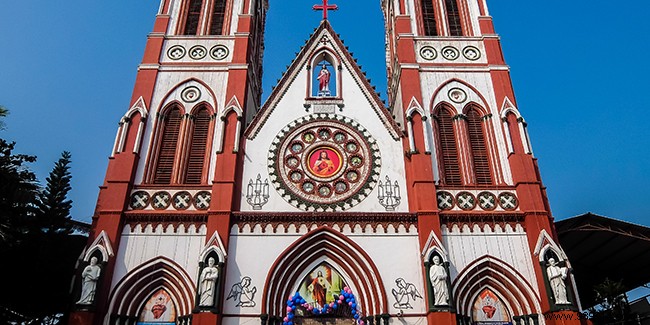
Located in the state of Tamil Nadu in India, the city of Pondicherry is still a small piece of France in this vast country. A former French trading post until 1956, Pondicherry is now an Indian city with still somewhat French accents.
Pondicherry was founded by the French in the late 17th century on the shores of the Bay of Bengal. It was then invaded by the Dutch then taken over by the French and then looted by the English before being returned to India in 1956. Pondicherry has thus gone through the centuries while retaining a bit of French culture. Since the 2000s, it has been able to showcase its Franco-Indian heritage to attract holidaymakers arriving from all over the world. The colonial heritage of the current city is a strange mix between the two countries.
In India, Pondicherry is considered a small city. A channel separates it in two. On one side, there is the Indian city and on the other, the colonial city. By visiting it, you will be able to discover architectural treasures, each as fabulous as the next. Some were left by the French. As you walk through the small white streets, observe the roofs made up of tiles, the balconies, the windows with wooden shutters and certain colonnades that will remind you of our country. You can also visit Catholic churches here.
Check out the Pondicherry Museum in the colonial city that was once the villa of a wealthy Frenchman. You can see period furniture and objects from our country. On your way out, you can enjoy buttery croissants for breakfast while hearing Tamil spoken and passing people dressed in beautiful, colorful saris. At the end of the day, you will also be surprised to see Indians playing pétanque. Visit the Pondicherry market, you will be immediately disoriented, because you will be able to admire magnificent fabrics in very bright tones alongside a school of fish or fruit and vegetables. Then go for a walk along Beach Road to admire the sea until sunset. You will see many Indians there waiting for the last light of day. You have to take advantage of these rare images, because a pharaonic construction site started a short time ago and whose goal is to develop this beach for the tourists arriving more and more numerous on the spot.
Pondicherry is an Indian city whose French memory is still very present on every street corner or in many catering outlets. You will have the opportunity to read signs in French such as "le Café des Arts", "rue de la Marine", "Customs", "Travaux Publics", etc. Many restaurants and cafes also have a French name. There is also the French school in Pondicherry, which is very famous for being the first establishment to pass the baccalaureate exams every year, because of the time zone. If you miss French gastronomy, push the door of the cafes and restaurants of the city where you can always eat a waffle, a crepe and many other French dishes, but expect that they will be revisited a little in the morning. 'Indian anyway.
In Pondicherry, you can see or visit many buildings of French origin. There are superb palaces and luxurious Belle Époque villas with exotic gardens. Catholic churches are also very well maintained such as Notre-Dame-des-Anges and its pink color. Not far away, enter a "bakery" where you can enjoy very good cakes, chocolates, bread, pastries, and even galettes des rois if you wish.
In Pondicherry, you immediately go from France to India in a single step without the need for a passport. Thus, you will leave the French Quarter to visit the rest of the city. There, you cross a continent in seconds. You will immediately see Kolams drawn by women on the doorsteps of houses. These are very colorful designs that are made to signal that the Tamil New Year is near. Go see the Arulmigu Manaku Vinayagar Temple which is the main Hindu temple in the city. Here, everything is only bright colors and incomprehensible rituals for us. Bare-chested priests mark the foreheads of the faithful and, believing them, cover their ears while skipping in place. Women crack coconuts on the sidewalk.
Once you cross the old canal separating the districts, you will find a city full of rubbish, but extremely lively. There are no more sidewalks and the stores are built one after the other. Scooters and rickshaws are extremely numerous and pass you constantly. The city teems, the city smells, the city lives. On MG Road, on Sundays, the fruit market Goubert Market is to be seen for its colors, the smiles of the Indians.
One cannot visit Pondicherry without going to Auroville located only a few kilometers from its center. It was founded in 1968 by a Frenchwoman. Auroville welcomes all religions and origins that have a philosophy in common. Here, we leave behind the noise of modern human bustle and live to the rhythm of nature. Auroville represents for many a sanctuary imagined by hippies wishing to live in a better world. In Auroville, we eat organic food, the energy is clean. The objective of the place is to serve future generations to live in a better and ecological world. If you can, stay in the place for several days. You can even indulge in meditation and personal development classes.
In Pondicherry, you can go back to a still recent past and meet people who still speak our language fluently. This city evolves to the rhythm of its country and if you still want to find the few traces of our history in its culture, it is time for you to go there, because India is a vast country with a growing population and whose evolution is very fast. It's a safe bet that in a short time, the traces of this counter will remain only in the history books of our country.